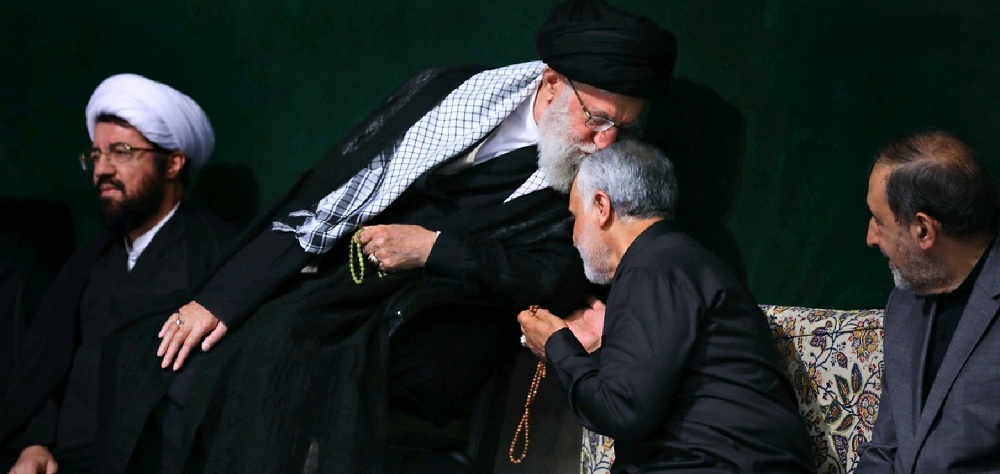Alwaght- West Asia region over the past year is recognizable with its various developments and incidents that have left deep effects not only on the region but also on the whole world, with their range observable to an uncertain time in the future. The developments in the region sometimes are interwoven with distinctive figures whose considerable weight in the course of the developments is observable. One regional figure of distinction is Iran’s Qasem Suleimani, the prominent commander known to the regional public and all of those closely following the regional occurrences.
Qasem Suleimani, whose name is associated with big wars, unbelievable victories, and an ironclad will on the battleground, has been an absolute nightmare to the enemies of the Iran-led Axis of Resistance over the recent years.
Major-General Suleimani was appointed the commander of the IRGC’s Quds Force in 2000. Before that, he served in the Iraqi-Iranian war of the 1980s as the commander of 41st Tharallah Division and co-commanded Valfajr 8, and Karbala 4 and Karbala 5. After the war and until he was appointed the commander of the IRGC-QF, he crushed the drugs smuggling cartels on the Iranian-Afghan borders.
Before the 33-Day War of 2006 launched against Lebanese Hezbollah by the Israeli regime, IRGC-QF was not that known to the people and the media hardly knew anything about it. But with the defeat of the much-vaunted Israeli military, which has always been advertised to the regional nations as an invincible force, by a relatively small group like Hezbollah at the time the world perceived the IRGC-QF’s role-playing and its strategist-chief Major-General Qasem Suleimani. Three times of confrontations between the resistant Palestinian groups and the Israeli regime after the 33-Day War, in all of which Tel Aviv was a losing side, called the attention of the military analysts, media, and even the politicians about the logistical and ideological factors behind the resistant groups, until the Arab uprisings, which marked a period of Islamic awakening, in 2011 promoted the name and prominence of the major-general to the regional public, triggering analyses on Suleimani’s character and job by the Western media and think tanks. The lack of news interviews with him and his decline to appear in front of the cameras and the documentary makers made the character of this great Iranian strategist shrouded in mystery and complexity for the West and the Israelis.
His name is also associated with crushing the history’s most brutal and violent terrorist group ISIS. After the rise of ISIS in Syria and Iraq as its starting points, Suleimani traveled to the two Arab countries and arranged popular forces for a fierce fight against the foreign-backed terror organization. He played a key role in foiling a large-scale foreign-designed plot for the region. It is said that he knows Syria inside out. That is beside his very good knowledge of Iraq. In 2014 Iraq’s Mosul fell to ISIS and the capital Baghdad tattered on the verge of fall to the terror fighters. But the city had a rescuer. The Iranian general organized units of voluntary Iraqi fighters under Popular Mobilization Forces (PMF), or Hashd al-Sha’abi, to press the militants out of Iraq. In a letter to Iran’s Leader Sayyed Ali Khamenei in 2017, he announced the mission to obliterate ISIS accomplished.
The role was in opposition to the Western evil designs for the region. The US and EU reacted to the victory, adding him and two other top IRGC commanders to their terror blacklist under the ruse of involvement in the Syrian civil conflict and developments. The Department of Treasury sanctioned him again following accusations of Iran’s involvement in bomb blast plot at the Saudi embassy in Washington. The story did not end with the sanctions. He was labeled an accomplice to the assassination of Rafic Hariri, the Lebanese prime minister who was killed by a bomb blast targeting his motorcade in the capital Beirut in February 2005. The moves against Suleimani reached a climactic point when lawmakers in the US Congress overtly suggested his assassination.
In March, Iran's Supreme Leader rewarded the commander with the “Order of Zolfaghar”, Iran’s highest military honor, making him be the first recipient of the honor after the 1979 Islamic Revolution.
Addressing Major-General Suleimani, Ayatollah Khamenei: “Thank God you made all these sacrifices and efforts. God has blessed our dear brother Qasem Suleimani with success. He, over and over, exposed himself to the enemy attacks. He fought for the sake of God and purely for God. We hope that God will reward him and mix his life with prosperity and his destiny with martyrdom. Martyrdom not now of course. The Islamic Republic still has work with him for years. But we hope the end be martyrdom. Happy your honor.”
As above mentioned, Qasem Suleimani is now a figure known for the regional public and the global media and politicians. This year, Foreign Policy magazine named him one of the top 100 global thinkers in the defense and security sector. Here is more from the global media about the Iranian commander:
Wall Street Journal: Major-General Suleimani is the head of the IRGC’s cross-border and secret operations.
Daily Star: Named him the man of anti-ISIS fight through 2014 and 2015. Referring to some of his traits, the British magazine wrote that his ideology is a mixture of soft and hard ways. He helped the popular forces of Iraq, the Daily Star continued, in opposition to the ISIS terrorists.
The Observer in an article: Quds Force’s chief Major-General Qasem Suleimani is very likely the only one to defeat ISIS.
Business Insider: Major-General Qasem Suleimani is the mastermind of anti-terror operations.
Newsweek: Major-General Suleimani is Iran’s military mastermind in counterterrorism.
The New Yorker: Qasem Suleimani is the strongman of the region.
“Why Qasem Suleimani is the most Powerful Operative in the Middle East?” This was the headline of an article published by the Business Insider in 2013. Geoffrey Ingersoll, the writer, described Suleimani the powerful figure of the region who could be anywhere in the region when he wishes.
In addition to the foreign media stories, there are more legend-like stories at home that have never been denied or confirmed by the official circles. One story was his text message to the American general and the other is a letter put on former Defense Secretary Leon Panetta’s desk during his Iraq visit.
It is said that the text message was sent via a cellphone delivered to General David Petraeus, the commander of the American forces in Iraq. The message allegedly read: “You have to know me. I’m Qasem Suleimani.” Panetta was immersed in wonder when he found a letter from the Iranian commander on his desk. The letter was a simple note without the Pentagon’s special seal, simply reading: “I can come even closer if necessary. Qasem Suleimani, the commander of Iran’s Quds Force.”



























